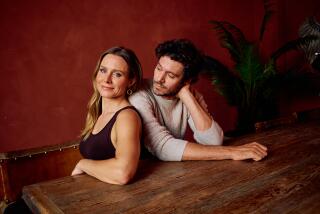‘Raised Right’ : Bebe Moore Campbell’s Loving Memoir Evokes the Importance of a Father
She does not believe in playing the lottery. She does not believe in playing the numbers. And writer Bebe Moore Campbell never dreamed that John Beresford Tipton would send Mr. Anthony with a check to her door in “The Millionaire.”
“I’m ambitious,” Campbell affirms with a nod of her head and a stiffening of her slender body that suggests flesh hung on steel. She always knew she would have to get what she wanted by her own sweat. And no one in her family was ever afraid of hard work, least of all her daddy, George Moore.
There also was a steeliness about him--literal and metaphoric. He was a paraplegic who never let distance, divorce or his paralysis keep him away from his only child. In his wheelchair, the young Bebe thought of her dad as the “black Ironside.”
It is the story of their seasons together in North Carolina, “Sweet Summer, Growing Up With and Without My Dad,” a widely praised memoir by Campbell, that has the author’s phone jingling off the kitchen wall.
All the sweat is paying off.
Bid for Film Rights
“That’s my agent. The paperback auction for the book is going on right now,” says Campbell, who admits that she has been a little edgy all day waiting to hear the results of the bidding.
But that’s just her New York literary agent. Beth Swofford, her agent with the William Morris Agency in Los Angeles, is in negotiations with Motown Productions and the Michael Douglas company for the film rights to “Sweet Summer.”
Naturally, she’s waiting for the best deal, Campbell says. “I don’t care who does it, as long as it’s a quality production.” But she already knows the actor she wants to play her dad. “Danny Glover,” she answers instantly but flatly.
She’s obviously given the starring role much thought, probably daydreamed the entire screenplay. But she seems almost afraid to admit--at least to a stranger--her excitement.
At 39, she is the mother of two with a teen-ager’s figure and the intense and weary gaze of an ancient. She is a free-lance journalist, too, and that may account for the look in her eyes--most reporters develop a protective cynicism.
Since 1976, when her first short story appeared in Essence magazine, Campbell has been prolific, turning out articles for the New York Times magazine, the Christian Science Monitor, Working Mother, SAVVY and Essence, for whom she is also a contributing editor. In 1986, her first book was published, “Successful Women, Angry Men--Backlash in the Two-Career Marriage.”
The word from her literary agent comes in: Ballantine Books has bought the paperback rights to the book, though, after some discussion, she decides it would be “tacky” to say for how much. In a later interview, her agent says the book was bought for “double” what the publisher expected, a figure in the “high five” digits.
Then, word comes that Motown Productions has optioned the film rights to the book for an undisclosed sum.
While Campbell, who is married to a Los Angeles banker, says her personal finances are improving, she’s nowhere near megabuck status--yet. “Sweet Summer” is not on the best-seller list and film rights are bought and sold every day--often without the movie ever being made.
Story Strikes a Nerve
But Campbell’s gentle, poignant story about her relationship with her father has struck a nerve. She’s been on “Today”; she’s done “Sonya Live”; she’s been on radio talk shows all over the country.
Why? Because people are hungry for positive images about the black family and black fathers in particular, she says.
Poet Nikki Giovanni, now a professor of English at Virginia Polytechnic University, called “Sweet Summer” “one of the more overdue books about and for the black community” in her review for the Washington Post.
Campbell’s father, George Linwood Peter Moore, was crippled in an automobile accident when his daughter was 10 months old. He lived at his mother’s home in Elizabeth City, N.C., and every June went to Philadelphia to get Bebe to “take her to summer.”
In 1977, he was killed, in another car accident. And with his death, Campbell writes, she lost “those men who used to entice me with their story telling, yank my plaits, throw me quarters and tell me what a pretty girl I was. . . . My father took to his grave the short-sleeved, beer-swilling men of summer, big bellies, raucous laughter, pipe smoke and the aroma of cigars. My daddy is really gone and his vacant place is my cold, hard border. As always, my life is framed by his absence.”
Crucial Message
Perhaps the crucial message in her book--one still not fully understood by society, Campbell says--is the importance of a father or a father-figure in a young girl’s life.
“Studies show that girls without that nurturing from a father or surrogate father are likely to grow up with damaged self-esteem and are more likely to have problems with their own adult relationships with men,” Campbell says.
“I think it’s very important at this time for black people to see that there are fathers, despite divorce, that stuck around and were responsible. We know in the black community, or come to expect, that mothers stick around and are responsible. And it’s not that I don’t give my mother credit for doing that. I do. But it’s very important at this point that we can look at some black male images that we can be proud of and to inspire some men who aren’t doing what they are supposed to be doing.”
The increasingly high rates of divorce, late marriage or no marriage among all Americans, but among blacks in particular, give credence to Campbell’s concerns.
Recently, the Center for Afro-American Studies at UCLA held a conference on the decline of marriage among African Americans. A conference report found that the long-established pre-1950 pattern of blacks marrying earlier than whites is ancient history.
“Between 1975 and 1985, the proportion of women who had ever married declined sharply from nearly 80% to 65% among blacks,” compared with 89% to 82% among whites. There was no change in the figure of 81% for Latinas.
The percentage of women who were divorced increased from 22% to 31% for black women, compared with 18% to 27% among whites, and only 18% to 20% for Latino women.
In the 1930s and 1940s, more than 90% of black men and women married, according to the conference report. But for a younger generation of Americans, at least 90% of white males and females born in 1954 are expected to marry by their 45th birthday, compared with 86% of black males but only 70% of black females.
Black Family Structure
“Clearly, these changes are dramatic and would seemingly portend a significant shift in the basic structure of the black American community and family,” the conference report said. “Among the more discussed consequences of these trends include an increase in the number of female-headed households with no male head (and) an increased burden of child-rearing being place on women.”
When Campbell takes questions about her book on television and radio shows, she hears the voices of these statistics. Some of them are “absentee fathers with whom the black community needs to find some creative ways of reaching out . . . to open up a dialogue. Some of these guys who call are asking for help. They are saying things like ‘I haven’t seen my kid, but I’m not a bad father’--because they don’t want to be labeled that. But they don’t know how to be a good one.”
Right away, she tells them she’s not an expert. But she suggests that they write to their children. Or “one of the things you can do is drop off groceries or clothing for your child.”
Sometimes, the fathers are so angry with their former wives that they don’t want to give them checks “because they think she’s going to spend it on some man.”
But a father can pay a baby sitter directly or give money directly to a doctor for bills or pay for the music lessons. “If you are serious about being in your child’s life,” she tells them, “you can find a way. If a judge said you are supposed to pay $200 a month in child support, you can find $200 worth of bills that specifically involve the child. You don’t even have to hand the money to your ex-wife. If men do this consistently--and I don’t mean to sound like a Pollyanna, because I know a lot of them won’t do this--but if they do, I can’t see too many women remaining angry when a man is taking care of their children.”
Spoken like the social worker she once wanted to be. Her mother is a retired social worker. Campbell, who majored in elementary education, graduated summa cum laude from the University of Pittsburgh. Several years later, she married a childhood sweetheart. The marriage ended in divorce. When that happened she said to herself, “Gee, what is this, a legacy . . . of divorce I’ve been handed down?”
Coping With Divorce
Her daughter, Maia, now 12, was 3 1/2 at the time her parents separated. She was very “angry,” Campbell says. “She acted out and let me know that she was unhappy.”
When her daughter reached the second grade, Campbell asked the school psychologist for help. “The psychologist formed a group of about four or five children . . . who were coping with divorce. And that really helped her a lot. They just came together and talked out some feelings that maybe she wasn’t letting me know. I began to see a change in her.”
Campbell’s first husband and her daughter have “a loving relationship.” And her daughter is “very close” to her stepfather, Ellis Gordon Jr. The author also has a stepson from her marriage to Gordon.
Perhaps the best thing her husband does “is help Maia see, in a way that I could not show her myself, what a good marriage is supposed to look like. And how a man is supposed to treat a woman. He is the person who will be responsible for her expectations as to how she will be treated as a wife.”
Her childhood memoir, like so many, is a prelude for the next phase in Campbell’s career as a writer: “My next book is a novel,” she says.
Asked what else her plans includes, she hesitates, “I’m trying to decide how much I want to tell.” She is silent for seconds, sifting her private thoughts. One wonders with whom, besides herself, is she silently communing?
Earlier, she reveals that in the midst of all the success surrounding her book, there have been deaths in recent weeks: a friend, an aunt and uncle.
In the empty space, the closing words to “Sweet Summer” seem appropriate:
“But I am lonely. . . . No strong hands reach out to boost me in ways that I was lifted before. . . .
“Long ago I realized that love is all that is required of fatherhood, that love will spark the action that it takes to mold a child. I have grown strong and whole from the blessings of my many fathers. Everything they gave me--roughness, gruffness, awkward gentleness, the contrast to my female world, their love--is as much a part of me as my bones, my blood. I was given a rich and privileged childhood, an American childhood, a solid foundation on which to stand and, yes, even go forward. I was guided by good men, powerful men. I was raised right.”
More to Read
Sign up for our Book Club newsletter
Get the latest news, events and more from the Los Angeles Times Book Club, and help us get L.A. reading and talking.
You may occasionally receive promotional content from the Los Angeles Times.






